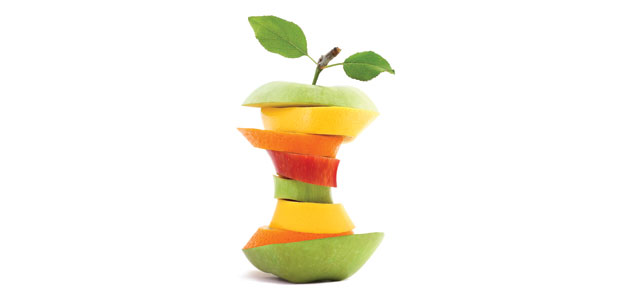Advertisement
Staying Regular
The importance of bowel health

The intestines are the waste disposal and water reabsorption centre for the body. Optimal digestive health depends on waste and toxins continually moving out through the bowels. This waste includes not only food, but also hormones and cells the body no longer requires.
Digestion and immune health
Providing your digestive system with healthy food and good microbes will enhance your ability to properly digest all the foods you eat. Further, good bowel habits can help to prevent many common bowel conditions and keep other body systems working properly.
The intestinal lining is protected by a large part of the immune system called the gut-associated lymphoid tissue. A fine balance exists between the bacteria found in the bowels and the ability of the intestines to defend against disease. Prebiotics such as inulin and fructooligosaccharides (found in bananas, leeks, garlic, and onions) increase the effectiveness of the microbes in the intestines, giving a natural boost to your immune system.
Common bowel conditions
Unfortunately, imbalances can occur, sometimes leading to painful and embarrassing symptoms. The following information may help pinpoint common bowel conditions.
Constipation itself is not a disease; it is an indicator of another issue relating to your digestive system. It is defined as fewer than three bowel movements per week and is a common and temporary health concern, primarily in women of all ages and in anyone more than 65 years of age. The symptoms to look for include stool that is hard and dry or that causes straining.
To prevent constipation, increase your fibre intake to 21 to 38 g per day, stay hydrated, do not ignore your body’s urge for a bowel movement, and keep active.
Diverticulosis is a bowel condition that occurs when small pockets of the intestinal lining bulge through the intestinal or colon wall. If these pockets of lining become inflamed, it is called diverticulitis.
The symptoms of diverticulosis include abdominal discomfort, bloating, and constipation. These are vague symptoms that may relate to one of many digestive concerns. Diverticulitis symptoms, on the other hand, come on suddenly and severely. They include abdominal pain in the lower left side, nausea, vomiting, and fever. To prevent diverticulosis (and, therefore, diverticulitis) a high-fibre diet is often the first recommendation, as it is thought that straining for stool may lead to pressure on the colon walls, making them susceptible to weak spots.
Fecal incontinence is an upsetting condition characterized by an inability to hold the bowel movement. Fecal incontinence is often caused by weak pelvic floor muscles, hemorrhoids, diarrhea, or muscle or nerve damage to the sphincters.
A proper diet full of fibre and whole grains can often correct the underlying issue if it relates to improper digestion or improper bowel habits. “Bowel training” is often helpful to re-train the body to have a bowel movement at specific times during the day. Pelvic floor exercises, characterized by squeezing and relaxing the pelvic floor 50 to 100 times daily, may also be beneficial.
Inflammatory bowel diseases (IBDs) cause inflammation and irritation to the intestines. The most common IBDs include Crohn’s disease and ulcerative colitis, and symptoms include severe or chronic abdominal pain and frequent diarrhea. Other symptoms include rectal bleeding, weight loss, and fevers.
Often IBDs are genetically inherited, and those who smoke have a higher risk of developing Crohn’s disease, in particular, than those who don’t. The true cause of IBDs is not fully understood; however, the current hypothesis is that the immune system overreacts to harmless bacteria or food, thereby increasing the white blood cells in the intestinal lining, which leads to chronic inflammation and injury to the intestines.
Colorectal cancer occurs in either the colon or the rectum and begins as a polyp that forms along the lining. A polyp is often noncancerous in the beginning stages, but over time the cells change and the resulting cancer can spread to the wall of the colon or rectum and then onto the blood and lymph systems.
In the early stages, the polyp may provide no symptoms. However, when symptoms do appear, they include bloody stool, fatigue, abdominal cramps, constipation, stool that is narrow, gas, and bloating. A colonoscopy can detect polyps and greatly minimize the likelihood of colorectal cancer development.
Diet modifications
Fibre-rich foods such as whole grains, legumes, fruit, and vegetables help the colon function optimally to remove waste products from the body. Fibre is helpful to soften the stool and is thought to bind to cholesterol for removal. Soluble fibre absorbs water and slows down digestion and is found in oats, fruit, nuts, and beans. Insoluble fibre acts as a bulking agent to speed up digestion and is found in seeds, grains, and the skin of fruits and vegetables.
Lifestyle modifications
Chewing food properly is the first step to proper breakdown of foods. There are certain enzymes in your saliva that, along with mastication, reduce the size of food particles entering the digestive tract. Chewing food also signals digestive enzymes and stomach acid to be produced in the next step of digestion.
Proper water intake is essential to optimal digestive health. Water is important to keep the intestinal lining well lubricated and to prevent excess water reabsorption from waste material, leading to dry and hard stool. With normal aging, our thirst response decreases and dehydration is a risk. Sipping water throughout the day aids in digestive health and keeps all of your body processes well hydrated. a
Tips for keeping the bowels moving
| Tip | Reasoning |
| Increase fibre in your diet. | Nuts and seeds, whole grains, and fruit and vegetables contain fibre, which helps to move waste products and toxins out of the intestines. |
| Get up and move. | Cardiovascular exercise is a great way to lose weight and to keep your digestive system working efficiently by keeping food moving and stimulating natural contraction of the bowels. |
| Drink your water. | As part of the aging process, our thirst levels tend to decrease. By sipping water throughout the day, the colon stays well hydrated and is able to move waste products and toxins along without drawing water from them. This minimizes the risk for dry, hard stool and constipation due to dehydration. |
| Review your medications. | Some medications may cause constipation, including diuretics, antidepressants, and some iron supplements. Discuss proper dosages and side-effect management with your health care practitioner. |
Supplements for bowel health
The following supplements may benefit those with digestive troubles. Please consult your health care practitioner when considering taking a new supplement.
| Supplement | Description | How much do I need? |
| Probiotics |
|
Dosages range from 10 billion to 100 billion organisms per day. |
| Digestive enzymes |
|
Typical dose is 1 capsule with each meal. |
| L-glutamine |
|
General recommendation is 4 to 5 g per day in the powdered form. |





